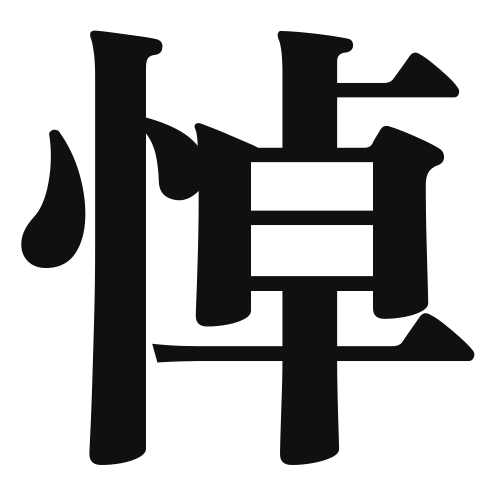1. Overview of Meaning
The kanji “悼” (pronounced “tou”) means to mourn or grieve for someone who has passed away. It conveys a deep sense of sorrow and respect for the deceased.
2. Formation and Radical
Formation of the Kanji: The kanji “悼” is a compound character, combining elements that represent emotions and thoughts. It is classified as a compound character (会意文字), as it combines the radical for “heart” (心) with the character for “to speak” (道), symbolizing the expression of feelings from the heart.
Radical: The radical of “悼” is 心 (kokoro), which means “heart” and is commonly associated with emotions and feelings.
3. Examples of Usage
Common Words and Phrases:
- 悼念 (とうねん, toumen) – mourning
- 悼詞 (とうし, toushi) – eulogy
Example Sentences in Daily Conversation:
- 彼の死を悼む気持ちを表したいです。 (かれのしをとうむきもちをあらわしたいです。) – I want to express my feelings of mourning for his death.
- 悼詞を読むことは、故人を敬う大切な行為です。 (とうしをよむことは、こじんをうやまうたいせつなこういです。) – Reading a eulogy is an important act of honoring the deceased.
4. Synonyms and Antonyms
Similar Kanji:
- 哀 (あい, ai) – sorrow; this kanji emphasizes the feeling of sadness but does not specifically denote mourning.
- 悲 (ひ, hi) – sadness; this kanji also conveys a sense of sorrow but is more general in its application.
Antonyms:
- 喜 (き, ki) – joy; this kanji represents happiness and is the opposite of mourning.
5. Cultural and Historical Background
Relation to Japanese Culture: In Japan, mourning is an important cultural practice, and the kanji “悼” is often used in contexts related to funerals and memorial services. It reflects the deep respect for ancestors and the deceased.
Proverbs and Idioms:
- 「故人を悼む」 (こじんをとうむ) – to mourn the deceased; this phrase is commonly used in condolences.
